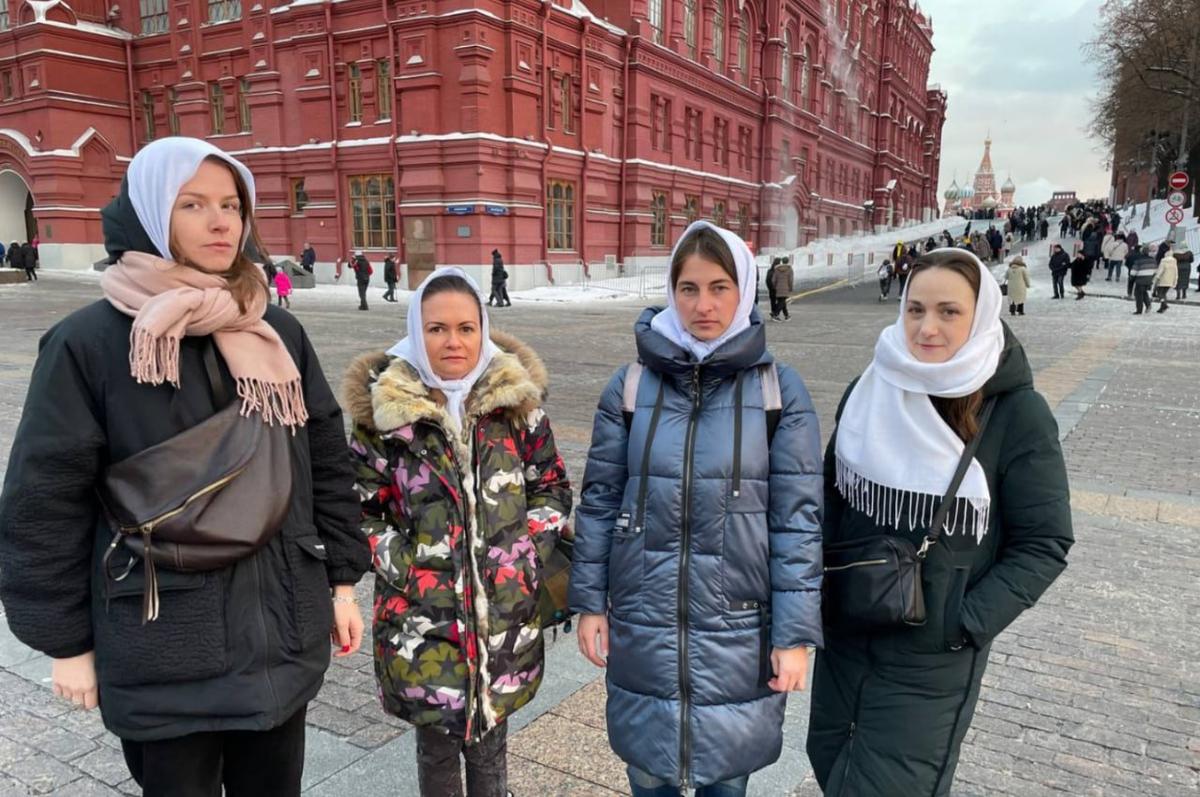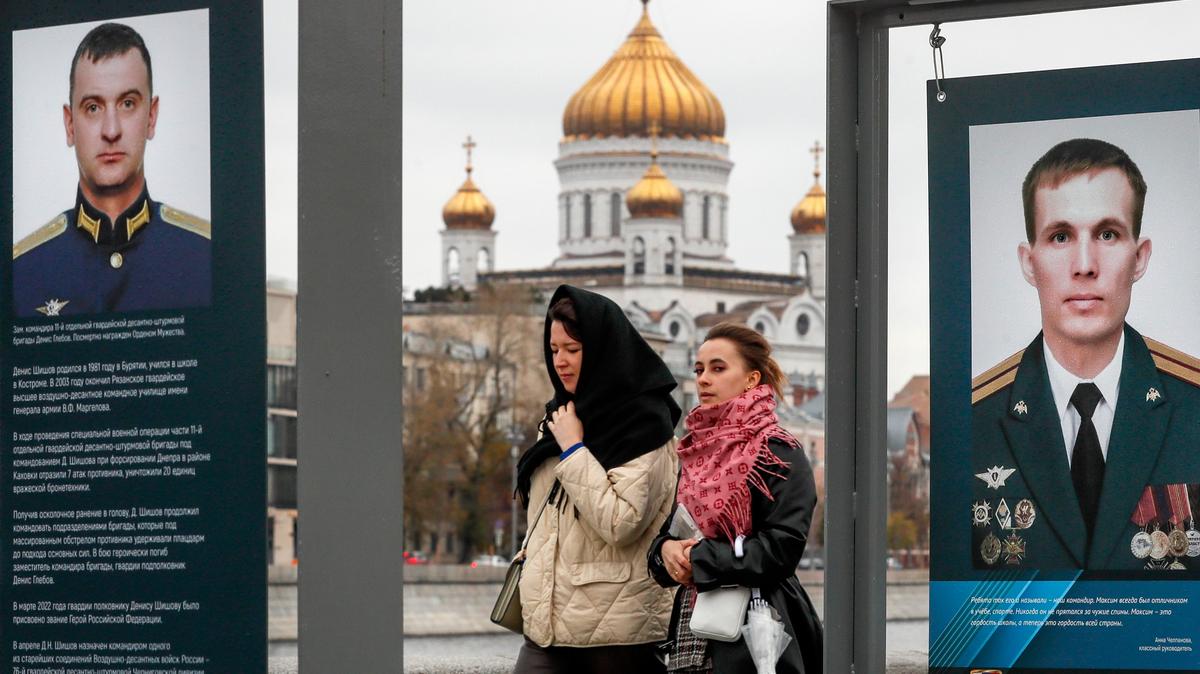Vladimir Putin declared 2024 the “year of family”. But in thousands of Russian homes, this New Year will be celebrated without husbands, fathers, sons, and brothers. This is mostly thanks to the “partial” mobilisation of 2022, which sent at least 300,000 military reservists and former personnel to fight in Ukraine.
In early November, dozens of conscripts’ wives brought signs and posters to a rally in central Moscow organised by the Communist Party of Russia. Although the protest lasted no longer than five minutes, it was enough to attract the attention of oppositionist and independent media — and even, it seems, the government. Journalists from Veter, a project by Russian independent reporters, spent more than a month talking with these women to understand how their lives have changed since mobilisation.
In this video, three conscripts’ wives — Paulina, Maria, and Inna — share their stories.
Mobilisation in Russia
Officially, the recruitment and mobilisation of conscripts lasted just over a month: on 20 October 2022, Minister of Defence Sergey Shoigu informed Putin that partial mobilisation had been successfully completed.
At that point, Shoigu reported that 300,000 people had been mobilised to Ukraine — although other sources have estimated that the true number might exceed half a million.
Throughout 2023, the Ministry of Defence primarily recruited contract servicemen; soldiers from the reserves have not been called up since 2022. However, the partial mobilisation decree is still in force, which means that a new wave of mobilisation could begin at any time.
Russia’s military and political leadership have not announced how many conscripts they might enlist, and in September, Andrey Kartapolov, chairman of the State Duma Committee of Defence, announced that conscripts would not return home until the end of the war. By contrast, voluntary servicemen have set contract periods, and prisoners are released after six months at the front.
In the short term, conscripts are also treated worse than other servicemen. By law, every soldier is entitled to military leave every six months, but many mobilised soldiers have not returned home once. Some human rights organisations, like the NGO “Get Lost”, have claimed that contract soldiers are granted more time off than conscripts.
Soldiers conscripted through partial mobilisation also must live with uncertainty about how long their terms will last. This, too, sets them apart from voluntary servicemen, who have set contract periods, and prisoners, who are released after six months at the front.
Frustrated by these inequities, conscripts’ wives began to find each other online. In chat rooms, they discussed the situation on the frontline, how to buy equipment for their husbands, and even the details of soldiers’ salaries. Soon, some members of the group started discussing how to bring their husbands home.
‘Return Our Men’ online group
In December 2022, Shoigu announced plans to replace conscripts with contracted servicemen. The goal, he said, was to reach 521,000 contracted soldiers by the end of the year. Throughout the year the authorities’ reports suggested significant progress toward this number. But the majority of conscripts weren’t returned home: and when they were, it was often dead or with serious injuries.
Simultaneously, conscripts’ family members continued to band together on social media, posting petitions to officials, collecting electronic signatures, and reporting on their meetings with deputies about the return of mobilised servicemen.
In the summer, several of these online groups joined together in an effort to get information on the timeframe of service and, ultimately, to get their husbands back as soon as possible.
One of the largest groups is led by Olga Katz, a beautician from Novosibirsk, whose younger brother was conscripted in the first wave of mobilisation. With the support of the group she heads, called “Return our Men’’, Olga collected signatures for a petition to Putin. In September, she handed over a list of collective demands, signed by more than 100,000 people, to the President’s office in Moscow. She received a standardised response with no concessions. A week later, her younger brother died at the front.
“He was 25 years old, and he hadn’t gotten married or had children yet,” Olga wrote after his death. “But he was so loved and cherished by all his family, friends, and colleagues. He is forever in our thoughts. My heart is broken. I have nothing left.”
Members of “The Way Home” Telegram channel had had a similar experience petitioning authorities. Today, “The Way Home” channel is the largest online community for conscripts’ wives. It was members of this group who protested in Moscow in November; they had started considering the action in September after Kartapolov’s announcement about conscripts’ indefinite term of service.
Maria, a member of the “The Way Home” group, said she and other members had already received countless “copy and paste responses” to their petitions. All of the responses essentially informed the women that conscripts would not be returned before the end of the special military operation.
“We expected that on the anniversary of partial mobilisation, the president would make a speech announcing that conscripts would be replaced with contracted servicemen,” Maria said. “But no one said anything.”

Members of “The Way Home” group on the Red Square. Photo: “The Way Home” Telegram channel
Although all the women in the groups want conscripts to be returned, their attitudes about the war itself vary. One of the administrators of “The Way Home” group, who asked to remain anonymous, said she strongly opposes both Putin and the war and that she joined street protests after Navalny’s poisoning and the arrest of Meduza journalist Ivan Golunov. But the group’s published manifesto is more moderate: “We are not interested in rocking the boat or destabilising the political status quo,” the manifesto reads.
“We are focused on the way home. We are determined to bring our men back home at all costs.”
Still less controversial is the “Return our Men” group, which officially supports both Putin and the “special military operation”; another group, called “Time for the Mobilised to Come Home”, claims it even wants to improve the Russian military by reducing the use of conscripts. In that group, some members go so far as posting ads for military contracts.
“Some people say we’re complicit [because we allowed our husbands and brothers to leave in the first place],” Maria said. But, she pointed out, resisting mobilisation would have presented serious problems of its own. “People can be imprisoned for evading conscription. A mobilised man would have to go on the run and hide in basements. He wouldn’t be able to hold a job or support his family.”
For Maria, joining online groups — and agitating for conscripts’ return — is both a distraction and the only alternative to depression. “We need to fight,” she said.
How the Kremlin snuffs out protests
After the Moscow protest, women on the “The Way Home” Telegram channel attempted to organise their own regional protests. However, only one of these, in Novosibirsk, actually came to fruition. However, it was a tepid and highly monitored affair: held in a local recreation centre, the ‘protest’ admitted only pro-government journalists and women who could prove that they had deployed relatives. As a result, only around thirty people came.
After November’s Moscow protest, police showed up at participants’ houses to castigate and threaten them. Officials throughout Russia also began denying more requests to hold rallies. “The Way Home” channel was inundated by spam and propaganda, some of which accused members of working for Navalny or the Ukrainian Special Forces. Soon after the rally, Telegram labelled the channel ‘fake’, most likely in response to spam reports.
The Kremlin did not officially comment on the situation. However, sources reported on predictions from within the presidential administration that the discontent of “The Way Home” group is viewed as a major possible stumbling block for domestic policy in the upcoming presidential election.
“I just want conscription, and the war in general, to end as soon as possible,” Paulina said. “Why fight when we can sit down at the negotiation table and resolve our issues? But our leadership knows what’s best.”
Inna agrees: “The longer this lasts, the more grief families will face.” She added that she maintains hope for peace negotiations.
Join us in rebuilding Novaya Gazeta Europe
The Russian government has banned independent media. We were forced to leave our country in order to keep doing our job, telling our readers about what is going on Russia, Ukraine and Europe.
We will continue fighting against warfare and dictatorship. We believe that freedom of speech is the most efficient antidote against tyranny. Support us financially to help us fight for peace and freedom.
By clicking the Support button, you agree to the processing of your personal data.
To cancel a regular donation, please write to [email protected]

